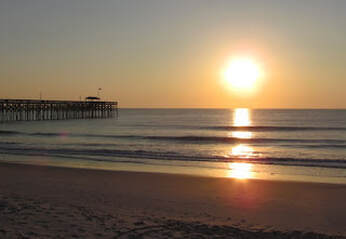 Dennis Lehane has written one huge thing, one enormous life-shadowing thing, one thing that he will have to live with for the rest of his life. What does it mean to wake up every morning and know you have done your absolute best thing. That there is no chance, zero, nada, bupkis that you will ever write anything close to as good in the entire rest of your life. Do you want to stop? Or do you just pretend that it’s not true? That maybe you will write something just as good. It seems to me that there are two tragedies for an artist – one, knowing with the certainty of the sun that you will never do your best thing. That you never had what it took - the determination or the skill or the insight or the luck…goddamn the luck… or the right woman or the wrong woman or the worst thing or the best thing or just some fucking thing…the right pencil, the right paper, the right weather, peace and quiet, hellfire and brimstone, Captain and Tenille, Three Hail Mary’s and an Our Father or Two Bloody Mary’s and a Bourbon Daddy…whatever. Because I’m pretty sure there’s a time when you’re too old to write your best thing – that last petal has fallen. And you know it.
Or two, doing your best thing young. And knowing it. Born to Run. London Calling. Calling your shot – 37 years old and your last post-season dinger ever. Leaving Sonny on his stool and then on the canvas in the space of 15 months. Mystic River. Dennis Lehane has written a great book - the best book of anybody on this list so far. Hands down. One of the best books of the twentieth century. Maybe Lehane was punching above his weight, but with this book he goes toe-to-toe with the best of ‘em…Hemingway, Steinbeck, Marquez (and any of a bunch of other writers I haven’t read). And I know it was published in 2001 so officially it is a 21st century book but this is a book of and about the 20th century. It’s about muscle cars and network television and World War 2 and the Vietnam War and Nixon and Reagan and rock’n’roll and the Mob and Whitey Ford, Bob Gibson, the Yaz and the Curse of the Bambino and Saturday morning cartoons just before Saturday morning wrestling and Francis the Talking Mule and Ma and Pa Kettle and flying to Vegas for the weekend and the Marlboro man and shrimp cocktail and hide’n’seek until dark and afternoon mass during Lent and priests sneaking a smoke behind the vestibule. And it’s about your neighborhood. Yeah, your real neighborhood – nothing virtual about it. Too big to own and too small to hold you. And it’s about being a man. In a way that I’m a little ashamed to talk about but was as real as dirt growing up in the 20th century. Aspiring to be something that a woman couldn’t – getting up off the ground, dusting off your pants, stepping into a high hard one and knocking it back down his fucking throat, seeing the fight coming and swinging first and putting him down hard…so he didn’t want to get back up. Always getting back up even if the next one left you dribbling pablum for the rest of your days, never chewing on anybody’s pain but your own. It was dumb and it closed more doors than it opened - for women, sure…but for men too. But you can’t convince me that something didn’t get lost when we kicked that guy to the curb. Lehane wrote about a time and a place and a certain group of people and it was a big time, a big place and big people… nobody did it better. The first five pages of Mystic River set the time, place and people with absolutely no spare flesh – this is muscle, tendon, skin and bone – not an excess calorie gone to fat… and parched to make sure it’s all pulled tight as inhaled cellophane. Almost everything you need to know about what’s coming is in those five pages. The time and place… The bars had Irish names and Dodge Darts by the curb. Women wore handkerchiefs tied off at the backs of their skulls and carried mock leather snap purses for their cigarettes. The people – Jimmy Marcus, eleven years old and jumping onto the subway tracks just to show he didn’t give a shit. If he was aware there were rules – in the subway, on the streets, in a movie theatre – he never showed it. Sean Devine for whom life was, …like a held breath. And Davy Boyle, a kid with girl’s wrists and weak eyes… Dennis Lehane does more in those five pages than most writers can do in a hundred. The next thirty pages set the boulder in motion…and everything that follows is shocking, surprising, unanticipated and completely inevitable. What little I know of literary theory tells me that characters must take a journey, they must transform in the pages of a book. There is no book that I have read in my reading memory where a character is so transformed, is such a shockingly different character at the end of the book than he was at the beginning of the book while remaining absolutely true to who he is, than Jimmy Marcus. Never has a character arc so surprised me while seeming so inevitable. Marcus moves from a character we admire wholeheartedly to one we can, at most, admire reluctantly. That arc from good to bad is relatively rare in modern literature and is usually accompanied by some underlying message about the price that’s paid for the transformation – but in this book Marcus shrugs off traditional morality like a soiled shirt and, only after committing an act that no God could forgive, does he finally breathe deep and clean. There is no easy way out – night always falls and only the strong see the morning light. You know where the good guys slept because there’s a torn white hat and bloodstains. I’m pretty sure this is the story of America. If it hadn’t been kidnapped and sodomized by a couple of greaseball carnies in the sixties it might have been OK. Dennis Lehane has a body of work he can be proud of – the Kenzie and Gennaro books, the turn-of-the-century crime trilogy (The Given Day/Live By Night/World Gone By), The Drop – but Mystic River is the beating heart. Take away Mystic River and Lehane fades back into the pack – a good writer but I’m not sure a great one. It was difficult deciding whether Pelecanos or Lehane came second and in the end I gave the nod to consistency over that single blazing star that is Mystic River. Don’t get me wrong I really like the early novels starring X and Y. And his later more literary novels I also really enjoyed. But. Mystic River. There should be courses on Mystic River. What little I know of literary theory tells me that characters must take a journey, they must transform in the pages of a book. There is no book that I have read in my reading memory where a character is so transformed, such a shockingly different character at the end of the book than he was at the beginning of the book, while remaining absolutely true to who he was, than Jimmy Marcus. Never has a character arc so surprised me while seeming so inevitable. And the morality is so frigging ambiguous. Marcus moves from a character we admire wholeheartedly to one we can, at most, admire reluctantly. That arc from good to bad is relatively rare in modern literature and when we find it is often accompanied by some underlying message about the price that’s paid for the transformation – but in this book Marcus shrugs off traditional morality like a hairshirt and seems to be finally breathing deeply and cleanly only after committing an act most of us would consider unforgivable. Lehane does not allow any tidy conclusion, there is no comforting take home message.
1 Comment
Call me strange, but I thought Lehane's best work was the Kenzie and Gennaro books. Mystic River was him trying to hard to be a grown up "Author" worthy of fetes on the literary circuit and not just a work-a-day writer. For what it's worth, my bookshop has sold a LOT more of the Kenzie novels than Mystic River.
Reply
Leave a Reply. |
|


